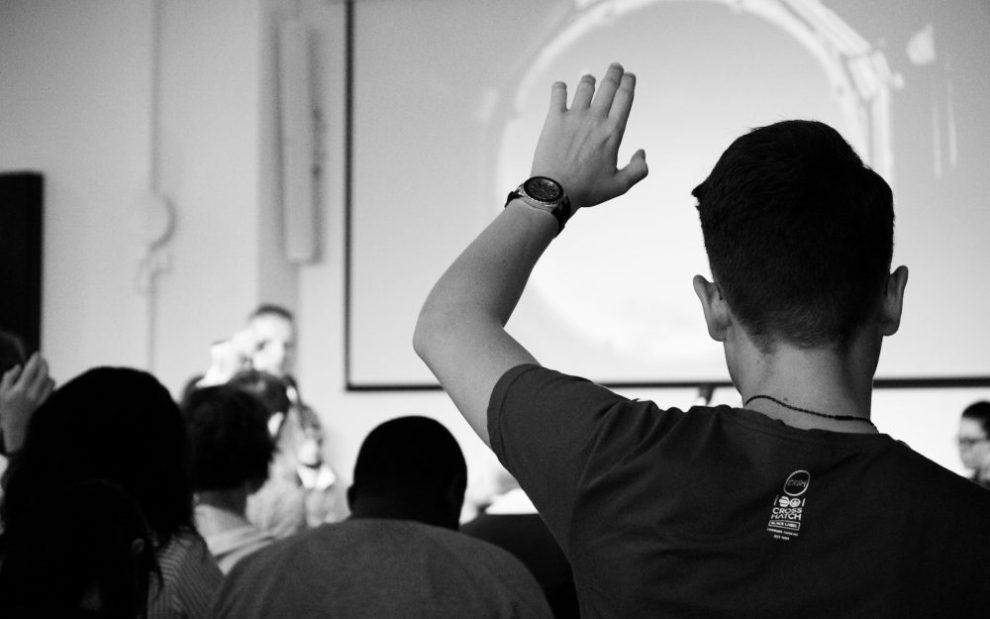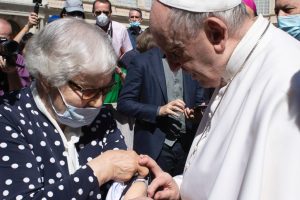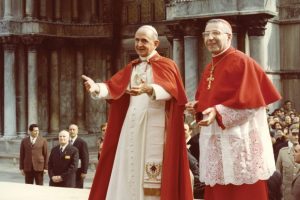“I can’t do this because I’m an atheist.”
“I can’t do this because I’m Christian, not Catholic.”
“I can’t do this because I don’t know what I believe.”
These were some responses I got from students. I appreciated the combination of honesty and cunning. Teenagers often put the two together to try to get out of an assignment in the first months of a high school theology class. This is especially true when that assignment asks them to reflect upon an experience in their lives that they would consider “religious”—that is, when one unexpectedly finds oneself in the presence of “something more” that can’t quite be named, can’t quite be understood, can’t always be logically categorized, but that is felt and experienced nonetheless.
After I stated the prompt, some students looked at me perplexed. Others laughed and shook their heads in disbelief. A few seemed to understand, and their mental wheels began to turn.
So, I got more specific. I asked them to raise their hands if any of the following applied to them: Who has been to a large sporting event? Hands went up. Who has been to a concert of any kind? Lots of hands went up. Who has ever had fun with family or friends? More hands went up. Who has enjoyed being out in nature? A few hands went up.
I continued: When you were at that concert, at that sporting event, with friends and family, or out among the trees and fresh air, have you ever had an intuition that you could not explain? Have you ever momentarily felt connected to something larger than yourself? Like you were part of something bigger, even though you couldn’t name it or may have even told yourself it was silly and pushed it away?
I didn’t ask for hands, just to nod their heads if it sounded familiar. Almost everyone nodded their heads. It now made more sense. I told them: That experience is what you need to write about. Don’t worry if it sounds “religious” or not. Just write about it in narrative form. And, as a follow-up, post a song to the class website that you think describes your experience. Preferably, a clean version of the song. You’ll explain to a partner later why you chose that song, and we’ll play a few of them in class.
Heads nodded. There were a few smiles, and everyone understood better what to do.
Teaching theology to teens is an art and a ministry. It is not merely passing on information, although that is one part of it. It is the process of accompanying them in their spiritual development wherever they are on the journey. It’s a practice of creating a safe space for honest questioning and conversation, teaching various prayer methods, and offering ways for them to integrate their experiences into a cohesive narrative that uses the long Catholic tradition as a foundational dialogue partner.
To that end, I have learned three things while teaching teens. First, students need to ask questions, be taught how to ask questions, and be given a safe space where any and all religious, theological, philosophical, life, and human questions are valued and taken seriously. These questions run the gambit from “Why does religion cause so much violence?” to “Do you, Dr. C., think Jesus was really God?” to “Why is the church so hateful toward LGBTQ people when Jesus was accepting and loving?” and “Is masturbation a sin?”
As a teacher I do not need to answer every question. After all, this is not algebra. Rather, it is the messiness of learning how to be human in the presence of a loving God. But I do need to respond to every question in a way that validates the question and the student, offers additional information or directions to think in, and remains open-ended for further reflection.
Second, teachers need to be more like coaches than pontificating professors. If you let them, teens will be very honest about how difficult it is to make sense of spirituality, to show love to an enemy, or to generally believe anything any adult has to say about theology. They need to be reminded that they are loved unconditionally by God and encouraged to seek out the divine in all things using whatever language makes sense to them. No student should be penalized for doubt, atheism, agnosticism, or resistance to Christianity or theology. Doubt, protest, rebellion, and skepticism are natural parts of youth spiritual development.
Third, all education is the formation of an entire human person, not just the intellectual “muscles” of the mind. Nowhere is this truer than in theology. Every day, teens are inundated with media messaging that claims there is something wrong with them. In order to fix this, they are told they need to look a certain way, speak a certain way, and act a certain way. And if they buy a variety of products, this will magically happen. So, teens need to know that they are valued, they matter, their voices matter, their questions matter, and theology can attune them to the infinite love and acceptance that God’s Spirit offers here and now.
Adults need to realize that many teens have been harmed by a religious tradition in one way or another and have good reasons for skepticism. That is why one of the best compliments I received from a student was that I presented Christianity in a way that was compassionate, reasonable, inclusive, and explorative of God’s Spirit in all things. The student had little interest in any church, least of all the one her family attended weekly—at least not at that moment. But she said for the first time she was open to Christianity in the future if her life went in that direction.
Back in the classroom, I have learned to anticipate students’ complaints and objections to any assignment. For the student who said they were atheist, I told them of course they still had to do the assignment. They just had to approach it from the perspective of whatever they thought their beliefs as an “atheist” entailed. They had to follow the guidelines while remaining true and honest to their own stage in life and its corresponding beliefs. I said the same to the students who did not know what they believe, to Protestant students, to Muslim students, and to confused students. In doing this, I was teaching them to think about God in the most Catholic way possible—analogically from their authentic experience of the “something more” to how this connects to God.
Theology is a process, journey, and struggle. The purpose of theology in a high school classroom is to assist in authentic human development more than the mere acquisition of new information. For no other discipline can assist youth in becoming integrated persons who can look beyond the immediate and begin to ask the most challenging questions: What is the ultimate meaning of your life? And how does that connect to how you actually live your life?
When teens know that you take them seriously as thinking and soulful young adults, they tend to take you more seriously as a teacher. And then they creatively engage in the work of theology: trying to articulate a meaningful word about God to themselves and others. And, most importantly, they do this by using their own terms. And that’s not nothing. That’s the beginning of a journey toward spiritual maturity.
Image: Unsplash/Felicia Buitenwerf













Add comment